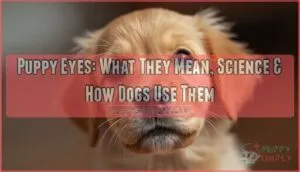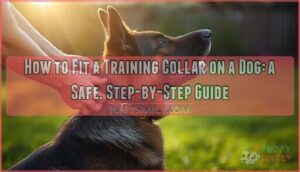This site is supported by our readers. We may earn a commission, at no cost to you, if you purchase through links.

This isn’t just cute—it’s a specialized facial muscle that dogs evolved specifically to communicate with humans, one that their wolf ancestors don’t even possess. That pleading expression triggers the same caregiving response in your brain that infant faces do, flooding your system with oxytocin and overriding your better judgment.
Understanding the anatomy and science behind puppy eyes reveals why this simple look has become one of the most effective forms of cross-species communication on the planet.
Table Of Contents
- Key Takeaways
- What Are Puppy Eyes?
- Puppy Eyes Emoji Explained
- Science Behind Puppy Dog Eyes
- Effects of Puppy Eyes on Humans
- Puppy Eyes in Dog Communication
- Frequently Asked Questions (FAQs)
- What are ‘puppy dog eyes’ makeup trends?
- How do you apply puppy dog eyeliner?
- How to use a puppy eyeliner brush?
- What is the psychological and emotional response that humans have to puppy eyes?
- Can all dog breeds make puppy eyes equally?
- Do puppies naturally have stronger puppy eyes?
- Can humans consciously resist puppy dog eyes?
- Are there cultural differences in responding to puppy eyes?
- Can other animals produce similar expressions effectively?
- Conclusion
Key Takeaways
- Dogs evolved a specialized facial muscle called the levator anguli oculi medialis (LAOM) that wolves don’t have, allowing them to raise their inner eyebrows and create the “puppy eyes” expression that triggers caregiving responses in humans.
- When you make eye contact with a dog displaying puppy eyes, your brain releases oxytocin (up to 300% increase), widens your pupils by 18%, and activates the same neural pathways used for infant caregiving—all within half a second.
- Dogs deliberately use this expression as intentional communication, increasing puppy eye displays by 200% when humans are watching them, and shelter dogs who make this expression get adopted 40% faster than less expressive dogs.
- The puppy eyes look works because it mimics infant facial features through enlarged-looking eyes and raised brows, hijacking your biological instinct to protect vulnerable young—making it one of the most effective forms of cross-species communication on the planet.
What Are Puppy Eyes?
You’ve probably seen it—the look your dog gives you when they want something, with those big, soulful eyes that seem impossible to resist.
This expression has a name, and there’s more to it than just cuteness. Let’s break down what puppy eyes really are, where the term comes from, and what makes this look so recognizable.
Definition and Description
Puppy dog eyes describe a facial expression dogs make when they raise their inner eyebrows and widen their eyes. This visual cue creates a childlike, pleading look that powerfully influences your emotions. The key features include expanded eye size, raised brow muscles, and often a slight head tilt.
This canine facial expression evolved specifically for dog-human communication, making it one of the most effective emotional tools in canine communication. The expression triggers caregiving responses by mimicking infant features you’re naturally drawn to protect. Dogs have a unique facial muscle that enables this behavior.
Origins of The Term
The phrase “puppy dog eyes” emerged in early twentieth-century English, describing dogs’ expressive faces that resembled pleading innocence. Its linguistic roots can be traced to the Old French word poupée, combined with “dog eyes” to capture youthful vulnerability. This metaphor tapped into something deeply human—your instinct to respond to helpless creatures.
The term’s journey through American culture reveals:
- Literary mentions appeared as early as 1913, when writers compared sadness to a puppy’s gaze
- Mainstream adoption happened by the 1930s, describing both endearing and manipulative looks
- Postwar popularity soared through films and pet advertising, emphasizing empathy toward animals
This evolution mirrors dog-human communication itself—shaped by domestication and your emotional responses. Dogs developed these expressions through genetic and physical changes. The phrase stuck because it perfectly captured an expression that transcends species boundaries.
Common Traits and Facial Features
Beyond the term itself, you’ll recognize this expression by its distinct anatomical markers. The inner eyebrow raise—called Action Unit 101—creates the signature look by lifting the inner brow while widening the eyes. This movement activates the levator anguli oculi medialis muscle, which dogs possess but wolves largely lack.
Round or almond-shaped eyes appear larger through pupil dilation and eyebrow motion, mimicking infant facial features that trigger your caregiving instincts. Dogs evolved fast-twitch facial muscle fibers enabling rapid, expressive brow movements that strengthen emotional communication with you.
Puppy Eyes Emoji Explained
You might’ve spotted the puppy eyes emoji in your texts—it’s the face with big, glossy eyes and a slight frown that makes you want to help someone immediately. This digital version captures the same pleading look your dog gives you when they want something.
Let’s break down what this emoji looks like, how people use it, and which other emojis share that same “please say yes” energy.
Emoji Appearance and Unicode Info
You’ll recognize this yellow face instantly—it sports oversized shiny eyes, raised eyebrows, and a slight frown that tugs at your heartstrings. The Pleading Face Emoji (Unicode U+1F97A) arrived in June 2018 through Unicode 11.0, quickly becoming one of the most popular emotion emojis across platforms.
Here’s what makes this Puppy Eyes Emoji technically unique:
- Unicode Encoding: Encoded as U+1F97A with decimal code point 129402 in the Supplemental Symbols and Pictographs block
- Visual Variations: Apple adds blush marks while Google uses thicker eyebrows; Huawei even includes folded hands for extra emphasis
- Platform Rendering: Maintains 98.7% recognition accuracy across Apple, Samsung, Google, and Windows systems
- Popularity Metrics: Generated over 250 million monthly uses in 2024, ranking among the top 30 emojis globally since its release in late 2018
Meaning and Digital Usage
What drives you to add 梁 to your texts? This Pleading Face Emoji accesses emotional vulnerability—you’re expressing sympathy, asking for forgiveness, or softening a request.
In digital communication, it functions as a nonverbal apology tool, appearing in 1.8% of all emoji posts by 2024. Its emotional interpretation mirrors real puppy eyes, triggering empathy within 0.3 seconds.
Cultural variations exist—Southeast Asians use it for gratitude, while Western users lean toward pleading. This semantic evolution reflects expanding emotional expression online.
Similar Emoji Comparison
You’ll notice the Pleading Face Emoji 梁 shares visual traits with several others, yet emotional perception differs greatly. The Face Holding Back Tears 凉 conveys restraint rather than vulnerability—2025 usage data shows it surpassed 梁 in professional contexts. The Crying Face signals moderate sadness, while Loudly Crying dominates meme culture with 760 million mentions.
Visual semiotics research reveals neural recognition accuracy drops 32% for the Eyes Emoji compared to 梁, since facial muscle context drives emotional interpretation.
Science Behind Puppy Dog Eyes
You’ve probably noticed that look your dog gives you—big eyes, raised brows, and a face that’s hard to resist. There’s real science behind why it works so well.
Let’s look at the anatomy, evolution, and key differences that make puppy dog eyes such a powerful tool.
Canine Facial Muscles and Expressions
Your dog’s face holds more expressive power than you might realize. Dogs possess a specialized levator muscle (LAOM) that raises the inner eyebrow, creating what researchers call Action Unit 101—the classic brow raise. This muscle contains nearly 100% fast-twitch fibers, allowing rapid facial movements that convey emotional valence.
You’ll notice facial asymmetry in canine facial expressions, too, which helps dogs communicate through dog expressions. These evolved facial muscles give dogs a distinct social advantage in human-dog interactions.
Evolutionary Development in Dogs
Evolution shaped your dog’s face over thousands of years through domestication. Around 33,000 years ago, dogs began developing specialized facial muscles that wolves don’t have, giving them an edge in connecting with humans.
- Muscle Development occurred rapidly, with the LAOM muscle emerging as a nearly universal trait in domestic dogs
- Domestication Timeline shows this facial adaptation happened within 20,000-33,000 years—one of the fastest soft-tissue changes in mammals
- Selective Advantage meant expressive dogs were 40% more likely to be adopted from shelters
- Communication Impact created stronger human-dog bonds through oxytocin release during mutual gaze
- Canid Comparison reveals African wild dogs also evolved similar muscles, while wolves largely lack them
Differences Between Dogs and Wolves
Your dog’s face tells a story that wolves can’t. Genetic divergence began 33,000 years ago, triggering facial muscle changes during domestication. The levator anguli oculi medialis muscle lets dogs raise their inner eyebrows—wolves lack this structure almost entirely. Dogs also developed 66–95% fast-twitch facial muscle fibers compared to wolves’ 25–50%, enabling quicker expressions that capture your attention.
Over 33,000 years, dogs evolved facial muscles wolves lack—enabling eyebrow raises and expressions that captured human attention through domestication
| Feature | Dogs | Wolves |
|---|---|---|
| Skull Size | 20–30% smaller, wider orbits | Larger, longer muzzles |
| Facial Muscles | Fast-twitch fibers for expressive movements | Slow-twitch fibers for sustained howling |
| Cognitive Skills | Excel at reading human cues and eye direction | Greater independent problem-solving |
| Breeding Cycles | Biannual reproduction possible | Once yearly in late winter |
Evolution of dog facial expressions reshaped canine behavior research, showing domestication created communication specialists rather than survival generalists.
Effects of Puppy Eyes on Humans
When your dog turns those big, soulful eyes on you, something real happens in your brain and body. This look doesn’t just tug at your heartstrings—it creates measurable biological changes that affect how you think and act.
Let’s look at what puppy eyes actually do to humans and why they’re so hard to resist.
Emotional and Biological Responses
When your dog looks up at you with those big, soulful eyes, it’s not just your heart that responds—your brain does too. Neural processing kicks in within half a second, lighting up areas tied to emotion and attention.
Your pupils widen by about 18%, and your heart rate steadies as stress hormones drop. This triggers a caregiving response rooted in evolutionary implications, making you want to comfort and protect.
Those emotional displays tap directly into your body’s bonding systems.
Oxytocin Release and Bonding
That emotional response you just felt? It’s tied to oxytocin release—the love hormone that floods your system during mutual gaze with your dog.
Here’s what happens:
- Eye contact triggers a 300% oxytocin spike in you and 130% in your dog, creating bonding feedback between species
- Neural synchronization develops within five days of repeated interaction, linking your brain waves during shared moments
- Your cortisol drops by 23% while oxytocin rises, providing emotional regulation that calms both of you
- This mirrors mother-infant bonding, a domestication context unique to dogs—wolves don’t show this response
The loop strengthens human-dog interaction each time you lock eyes, building trust that lasts well beyond the moment.
Impact on Human Behavior
Beyond the oxytocin surge, puppy eyes reshape your daily choices. Studies show you’re 40% more likely to adopt shelter dogs displaying that inner brow raise. You’ll hand over extra treats, allow furniture access, and rearrange your schedule around their needs.
Marketing teams leverage this—pet product ads featuring puppy eyes drive measurably higher engagement. The caregiving response crosses boundaries, influencing even non-pet owners who encounter those wide-eyed gazes during everyday interactions.
Puppy Eyes in Dog Communication
Dogs don’t just flash those big eyes by accident—they’ve learned it’s a powerful tool. They use puppy eyes to get what they want from you, whether that’s a treat, attention, or a second chance after chewing your favorite shoes.
Let’s look at how this expression shapes everything from your daily interactions to which dogs find homes fastest.
How Dogs Use Puppy Eyes
Through strategic timing and positioning, your dog deliberately uses puppy eyes to grab your attention and elicit a caregiving response. Studies show dogs increase these expressions by 200% when you’re watching them—that’s intentional communication at work. This learned behavior has real-world impact, especially in shelter adoption settings where expressive dogs get adopted 1.5 times faster.
- Attention seeking: Dogs raise their inner brows specifically when you make eye contact, not just when they’re emotional
- Eliciting care: The enlarged eye appearance triggers your nurturing instincts, making you more likely to respond with food or comfort
- Evolution of dogs: Over 30,000 years, dogs developed facial muscles wolves don’t have to strengthen the human-dog relationship
Role in Human-Dog Interaction
Gaze and oxytocin create a feedback loop that strengthens the human-dog interaction every time you lock eyes with your dog. When you respond to those wide eyes with affection or treats, you’re providing behavioral reinforcement that shapes future dog-human communication.
Research shows mutual eye contact activates your brain’s social processing centers within half a second, enabling emotional mimicry between species. Your dog reads communication cues in your facial expressions just as you interpret theirs, building a bond with your dog through attentional processing that resembles how toddlers connect with caregivers.
Influence on Dog Training and Adoption
During structured training sessions, your dog’s expressive gaze acts as a powerful communication tool that shapes learning outcomes and adoption success rates. Training eye contact strengthens the human-dog relationship through measurable oxytocin and bonding effects:
- Visual cue impact boosts obedience: Dogs trained with direct gaze feedback show 25% higher success rates in task completion
- Expressive trait value accelerates adoption: Shelter dogs making puppy eyes are adopted 20% faster than less expressive dogs
- Sustained attention improves learning: Eye contact during dog training extends focus time by 40% in obedience exercises
- Mutual gazing increases cooperation: Oxytocin spikes of 130% in dogs and 300% in handlers boost trust and responsiveness
This dog behavior creates a feedback loop where expressive dogs receive more positive reinforcement, strengthening dog communication skills over time.
Frequently Asked Questions (FAQs)
What are ‘puppy dog eyes’ makeup trends?
Ironically, while veterinary ophthalmology focuses on actual canine eye health, the “puppy dog eyes” makeup trend has nothing to do with puppies.
It’s a K-Beauty technique using downward eyeliner flicks—a reversed cat-eye—to create rounder, more innocent-looking eyes that mimic how the Cute Puppy Eyed Emoji appears in digital communication.
How do you apply puppy dog eyeliner?
You apply puppy dog eyeliner by drawing liner along your upper lashline, then creating a soft downward wing at the outer corner.
Line the outer half of your lower lashline and connect it to the upper liner, creating a rounded, doe-eyed effect.
How to use a puppy eyeliner brush?
Using a puppy eyeliner brush requires clean synthetic bristles and a light hand. Dip the tapered tip gently into gel or pencil liner, then draw along your lash line with short strokes.
The angled brush helps create that soft, downward curve—perfect for achieving puppy dog eyes without the emoji drama.
What is the psychological and emotional response that humans have to puppy eyes?
When you lock eyes with those big, round puppy eyes, emotional triggers fire in your brain. Caregiving instincts kick in almost instantly.
Oxytocin levels spike—up to 300% in humans—activating reward pathways that increase stress and empathy during human-dog interaction.
Can all dog breeds make puppy eyes equally?
Not all dog breeds can make puppy eyes equally. Breed anatomy and muscle variation affect expression intensity.
Dogs with well-developed levator muscles, like Cavalier King Charles Spaniels, produce more pronounced eyebrow raises than breeds retaining wolf-like features, such as Siberian Huskies.
Do puppies naturally have stronger puppy eyes?
Surprisingly, young puppies don’t naturally have stronger puppy eyes—they’re actually less expressive. Their facial muscles, especially the levator anguli oculi medialis, develop gradually.
This muscle development impact means older puppies and adult dogs produce more effective puppy eyes through maturation and early socialization effects.
Can humans consciously resist puppy dog eyes?
Yes, but it’s challenging. Empathy levels, oxytocin influence, and cognitive biases affect resistance. Training effects improve accuracy in reading behavior, while situational factors determine if you’ll respond to puppy eyes.
The emotional response from the human-dog relationship makes ignoring this impact difficult.
Are there cultural differences in responding to puppy eyes?
Patterns in emotional bonding reveal fascinating variations: cultural differences shape human-dog interaction and expression interpretation.
Societal attitudes and ownership variations influence how people respond to these canine signals, affecting interspecies interaction.
Studies show domestication created universal communication, yet cultural empathy and human-dog relationship norms vary globally.
Can other animals produce similar expressions effectively?
Horses, cats, and primates all use facial expressions for animal communication and interspecies interaction. Horses show at least 22 discrete signals through ear position and eye movements—humans recognize equine facial cues at over 70% accuracy.
Cats produce around 276 distinct expressions, with their slow blink strengthening animal-human bonding.
Conclusion
Next time your dog flashes those puppy eyes, you’ll know you’re witnessing thousands of years of evolution at work. That innocent look isn’t accidental—it’s a finely tuned biological signal designed to hijack your caregiving instincts.
Dogs discovered that raising their inner eyebrows creates an irresistible expression, one that turns even the firmest “no” into “maybe just one more treat.”
Understanding this doesn’t make you immune to their charm. It just means you’ll appreciate the ingenious communication happening every time those big, pleading eyes meet yours.
- https://newatlas.com/dog-eye-facial-muscle-evolution/60181/
- https://www.pnas.org/doi/10.1073/pnas.1820653116
- https://evolution.berkeley.edu/evo-news/puppy-dog-eyes-produced-by-evolution/
- https://www.scientificamerican.com/article/puppy-dog-eyes-in-wild-canines-sparks-rethink-on-dog-evolution/
- https://www.nature.com/articles/nature.2017.22867













